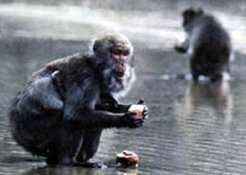
The 100th Monkey Phenomenon
 The Japanese monkey, Macaca fuscata, had been observed in the wild for a period of over 30 years. In 1952, on the island of Koshima, scientists were providing monkeys with sweet potatoes dropped in the sand. The monkeys liked the taste of the raw sweet potatoes, but they found the sand that clung to them unpleasant. An 18-month-old female named Imo found she could solve the problem by washing the potatoes in the ocean. One day, she rolled her potato down the beach and into the water. She retrieved it with no sand on it. She taught this trick to her mother. Her playmates also learned this new way and they taught their mothers too.
The Japanese monkey, Macaca fuscata, had been observed in the wild for a period of over 30 years. In 1952, on the island of Koshima, scientists were providing monkeys with sweet potatoes dropped in the sand. The monkeys liked the taste of the raw sweet potatoes, but they found the sand that clung to them unpleasant. An 18-month-old female named Imo found she could solve the problem by washing the potatoes in the ocean. One day, she rolled her potato down the beach and into the water. She retrieved it with no sand on it. She taught this trick to her mother. Her playmates also learned this new way and they taught their mothers too.
This cultural innovation was gradually picked up by various monkeys before the eyes of the scientists. Between 1952 and 1958 all the young monkeys learned to wash the sandy sweet potatoes to make them more palatable. Only the adults who imitated their children learned this social improvement. Other adults kept eating the dirty sweet potatoes.
Then something startling took place. In the autumn of 1958, a certain number of Koshima monkeys were washing sweet potatoes — the exact number is not known. Let us suppose that when the sun rose one morning there were 99 monkeys on Koshima Island who had learned to wash their sweet potatoes. Let’s further suppose that later that morning, the hundredth monkey learned to wash potatoes.
Then it happened. By that evening almost everyone in the tribe was washing sweet potatoes before eating them. The added energy of this hundredth monkey somehow created an ideological breakthrough!
Although the exact number may vary, the Hundredth Monkey Phenomenon means that when only a limited number of individuals learns and practices a ‘new way’, it remains the conscious property of those individuals. But when one more individual manifests this awareness and acts on it, the field is strengthened, a critical mass is reached and the awareness becomes the conscious awareness of all.
Moral of the story?
If we bring to the world through our lives what we learn about compassion, treating animals better, treating people better, creating a no kill community then it ripples outward. What’s the base of a community without killing? It may be one more act. Tell one more person of the change you’d like to see. Tell one more person of your vision of the future. If opportunity presents, save one more animal, feed one more stray.
Live your life aware that your approach to everything could become everyone’s approach to everything. Quietly do your regular job with faithfulness and love. I think every day in my job about what Mother Teresa said. “We can do no great things, only small things with great love.”
Today, make one compassionate food choice, feed a stray, love on your dog a few extra minutes, take a minute to whip out a note to someone telling them that they matter.
Here’s the beautiful thing to me — Imo the young monkey was not a CEO, she did not set out to head a movement, she didn’t have a college degree, a marketing strategy and hadn’t even finished growing up. She performed one small act. Everything we do may be just that powerful.
Nelson Mandela said that man’s greatest fear is not that he is powerless, it is that he is infinitely powerful. Contemplating that our actions may change everything around us is not something that most of us do. But maybe we should. It is an awesome responsibility to be sure. Let’s go out there and use it to make everything better.
Any one of us may be the 100th monkey. One of us is.
What do you want to teach the tribe ?
reprinted from Friends for Life website

What do you think?